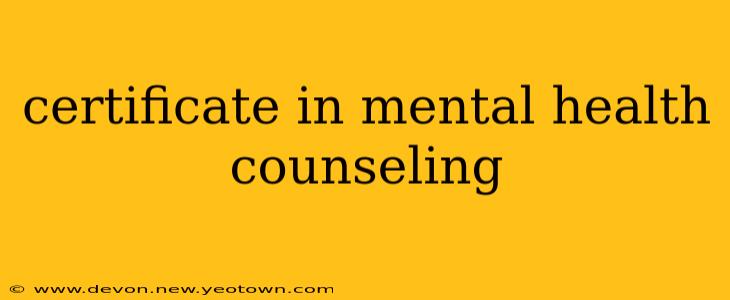The path to becoming a mental health counselor can feel like navigating a labyrinth, but it doesn't have to be. This journey often begins with a certificate, a stepping stone toward a fulfilling career helping others. This guide explores the world of mental health counseling certificates, answering your burning questions and illuminating the path ahead.
What is a Certificate in Mental Health Counseling?
A mental health counseling certificate isn't a standalone license to practice therapy. Instead, think of it as a focused credential demonstrating specific skills and knowledge within the broad field of mental health. These certificates can be incredibly valuable, whether you're a seasoned professional looking to specialize or someone just beginning their exploration into this vital field. They offer a concentrated learning experience, often focusing on a niche area like trauma-informed care, substance abuse counseling, or grief counseling. The completion of a certificate program often allows you to add this credential to your resume and may even give you an advantage in the job market, especially in combination with related education and experience.
What are the different types of mental health counseling certificates?
The variety of mental health counseling certificates available reflects the diverse needs within the field. You might find programs focused on:
- Specific populations: Certificates focusing on working with children, adolescents, adults, couples, or families.
- Treatment modalities: Programs centered around Cognitive Behavioral Therapy (CBT), Dialectical Behavior Therapy (DBT), or other specific therapeutic approaches.
- Specializations: Certificates focusing on areas like addiction counseling, trauma-informed care, grief counseling, or eating disorder treatment.
Choosing the right certificate depends on your existing background, career goals, and personal interests. Researching different programs carefully is crucial to selecting the best fit.
How long does it take to get a certificate in mental health counseling?
The length of a mental health counseling certificate program is highly variable. Some programs can be completed in as little as a few months, while others might take a year or more. The duration often depends on the intensity of the program, the number of required coursework hours, and whether it's part-time or full-time study. Always check the specific program requirements before enrolling.
What are the prerequisites for a mental health counseling certificate program?
Prerequisites vary significantly depending on the program and institution. Some programs may accept applicants with a high school diploma or GED, while others might require a bachelor's degree in a related field like psychology or social work. Some programs may even require prior experience in a mental health setting. Carefully review the program's admission requirements before applying.
Can a mental health counseling certificate help me get a job?
While a certificate alone won't qualify you to practice independently as a licensed therapist in most jurisdictions, it’s a valuable asset. A certificate demonstrates specialized skills and knowledge, making you a more attractive candidate for many positions. It's particularly beneficial when combined with other qualifications, such as a related bachelor's or master's degree and supervised experience. Many organizations look favorably upon individuals who continually invest in enhancing their professional development. For example, a certificate in trauma-informed care could significantly enhance a social worker's qualifications for working with vulnerable populations.
What is the difference between a certificate and a degree in mental health counseling?
The key difference lies in scope and licensing. A degree, typically a master's in counseling or a related field, is significantly more extensive, leading to licensure and independent practice. A certificate, on the other hand, provides focused training in a specific area but doesn't typically lead to licensure on its own. Think of a certificate as specializing within a field, while a degree is foundational to the field.
Embarking on this journey towards expertise in mental health counseling is a commendable pursuit. By carefully researching and selecting a certificate program aligned with your goals and aspirations, you can take a significant step toward a rewarding and impactful career. Remember to carefully investigate each program's requirements and accreditation status before committing. Your future clients will thank you.

